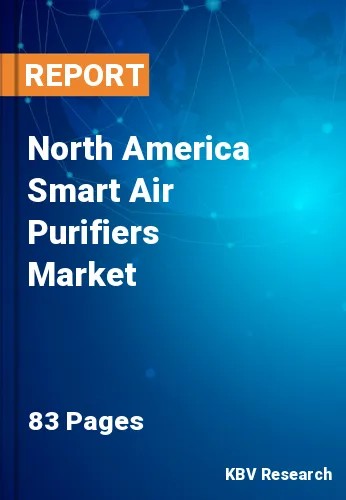The North America Smart Air Purifiers Market would witness market growth of 7.3% CAGR during the forecast period (2022-2028).
Asthma is a chronic lung disease that affects both children and adults. Due to inflammation and stiffening of the muscles around the tiny airways, the air channels in the lungs shrink. Asthma symptoms include coughing, wheezing, shortness of breath, and tightness in the chest. These sensations come and go, and they're usually worse at night or after exercise. Asthma symptoms can be exacerbated by other common factors. Viral infections (colds), smoke, dust, fumes, grass and tree pollen, changes in the weather, animal fur and feathers, harsh soaps, and perfume are all potential triggers. Air purifiers protect asthma patients from these triggers and thus enable them to live a stress-free life at least in the confines of their homes. This is likely to raise the demand for smart air purifiers in the upcoming years.
Asthma symptoms worsen as pollution levels rise. Asthma's cause is unknown, and there is currently no cure. Asthma is caused by a variety of environmental causes. The burning of fossil fuels in combustion engines, dust generated by traffic on road surfaces, and biomass used for cooking and heating are the main causes of environmental pollution. Particulate matter, ozone, nitrogen dioxide, and other volatile organic compounds are all present in high concentrations in metropolitan areas, making breathing difficult. The length of time particulate matter stays in the atmosphere and the sites of infection in the respiratory tract are linked to the health impacts of different diameters of particulate matter.
According to a new yearly analysis published in the Annals of Thoracic Society, air quality in the United States improved dramatically between 2010 and 2016, saving thousands of lives each year, but pollution levels have begun to climb again. In 2010, particulate matter and ozone pollution killed 12,600 people prematurely, according to the researchers. By 2016, the number of deaths had dropped by more than half, to 6,180. The following year, the death toll increased to 7,140. In the United States, a total of 5.0 percent of individuals have ever been diagnosed with COPD, emphysema, or chronic bronchitis (2020). There were 873,000 visits to emergency rooms due to COPD in 2020. Chronic lower respiratory diseases were the 6th biggest cause of death in the United States in 2020. 152,657 people died of these diseases just in 2020.
The US market dominated the North America Smart Air Purifiers Market by Country in 2021, and would continue to be a dominant market till 2028; thereby, achieving a market value of $2,493 million by 2028. The Canada market is poised to grow at a CAGR of 9.8% during (2022 - 2028). Additionally, The Mexico market would display a CAGR of 8.8% during (2022 - 2028).
Based on Technique, the market is segmented into High-efficiency Particulate Air (HEPA), Activated Carbon Filtration, Thermodynamic Sterilization System (TSS), Ultraviolet Germicidal Irradiation, Ionizer Purifiers, and Others. Based on Product Type, the market is segmented into Fume & Smoke Collectors, Dust Collectors, and Others. Based on End User, the market is segmented into Residential, Commercial, and Others. Based on countries, the market is segmented into U.S., Mexico, Canada, and Rest of North America.
Free Valuable Insights: The Global Smart Air Purifiers Market is Predict to reach $8.4 Billion by 2028, at a CAGR of 7.9%
The market research report covers the analysis of key stake holders of the market. Key companies profiled in the report include Dyson Limited, Honeywell International, Inc., Xiaomi Corporation, LG Electronics, Inc. (LG Corporation), Koninklijke Philips N.V., Sharp Corporation, Unilever PLC, Coway Co., Ltd., and Levoit (Vesync Co., Ltd.)
By Technique
By Product Type
By End User
By Country
Our team of dedicated experts can provide you with attractive expansion opportunities for your business.

